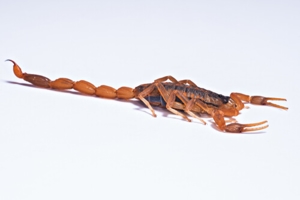
How to Avoid a Confrontation with a Scorpion
Scorpions are undeniably scary– they’re pretty big and their stings contain venom that causes a painful reaction in humans.
Although most scorpion species are more of a nuisance than a true danger, there is one type of scorpion, known as the Arizona bark scorpion, whose venom can potentially kill a human being.
But don’t panic– these are relatively rare, and most scorpion stings are painful but not truly dangerous.
Needless to say, scorpions aren’t a creature that you want around your home. However, in the southern and southwestern United States, they’re just a fact of life. This means that you should be as prepared as possible for dealing with a scorpion if you ever happen to see one.
Where do scorpions live?
Fortunately, scorpions don’t like to live indoors, which means that you’re unlikely to experience a scorpion infestation in your home.
A scorpion that’s entered a home or building has most likely done so inadvertently, on a quest for fresh water or food. But their true habitat is outdoors, in dry, arid regions.
Outdoors, scorpions tend to hide whenever possible. They tend to gravitate toward rocks, logs, and other debris. Their true “homes” are burrows dug into the earth, sometimes up to a few feet beneath the surface.
Where do scorpions live?
Fortunately, scorpions don’t like to live indoors, which means that you’re unlikely to experience a scorpion infestation in your home.
A scorpion that’s entered a home or building has most likely done so inadvertently, on a quest for fresh water or food. But their true habitat is outdoors, in dry, arid regions.
Outdoors, scorpions tend to hide whenever possible. They tend to gravitate toward rocks, logs, and other debris. Their true “homes” are burrows dug into the earth, sometimes up to a few feet beneath the surface.
When are scorpions active?
In general, scorpions are nocturnal– but you still might occasionally see them during daylight hours. Typically, scorpions leave their burrows to find food and water, or to find a mate.
Despite living in warmer, drier climates, scorpions don’t like hot temperatures, which means that the cooler night air is more appealing to them.
Their preference for cooler temperatures may lead scorpions into your home in an attempt to escape extreme heat conditions.
What should I do if I see a scorpion?
The most important thing to keep in mind is that scorpions don’t attack unless they feel threatened. In fact, they’re afraid of humans and will try to avoid us if at all possible.
It’s possible to unexpectedly disturb a scorpion when doing yard work like moving leaves or sticks off of your property. If you see the scorpion, proceed with caution. It’s best to avoid interacting with the scorpion to avoid the possibility of getting stung.
If you see a scorpion outdoors, your best bet is to leave it alone and vacate the area. It’ll go back to its home, where it helps to control the populations of other undesirable insects.
If a scorpion is present inside your home, avoid yelling or throwing things at it– this will just agitate it, and when agitated, a scorpion is more likely to go on the offensive.
We’d recommend using a broom or other tool to sweep the scorpion into a container of some kind and closing the lid tightly. Avoid making contact with it during this process!
If you’re concerned about the scorpion’s presence in your home or on your property, you can show the scorpion to a pest control professional to determine the species and figure out which steps to take next.
Killing a scorpion typically involves getting closer to it than we’d recommend, but it’s possible.
Trying to stomp or crush the scorpion might be unsuccessful, since they’re able to flatten themselves out and might not be affected.
The best method of killing a scorpion is to find a sharp object to pierce its exoskeleton– you might need to cut it into several pieces.
Time to call in the pros
Because scorpions are difficult to kill and potentially dangerous, we’d recommend contacting a pest control professional rather than trying to handle the problem yourself.
Based on the situation and species of scorpion you’ve encountered, the pros at Hopper Termite & Pest will determine a plan of action to eliminate scorpions from your home and prevent them from returning.
Don’t risk a sting– give us a call today!

Thank you very much for this important article.